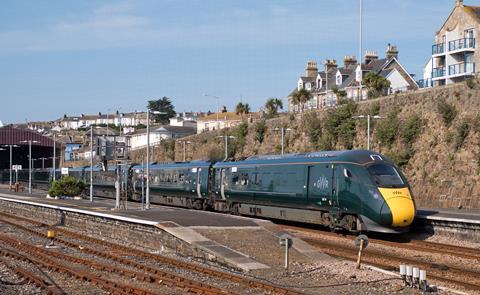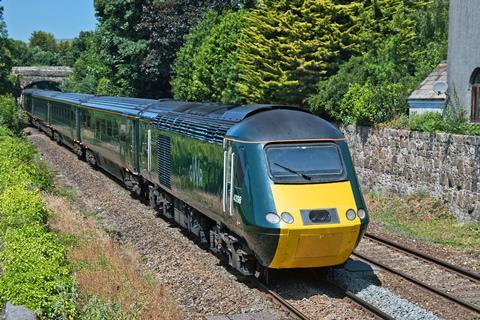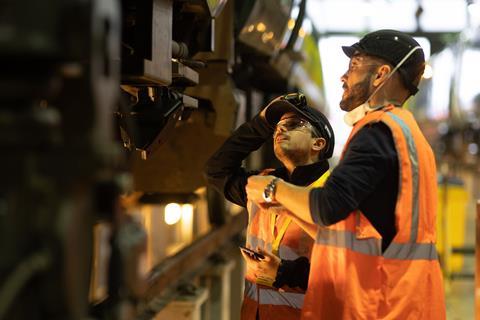
UK: Great Western Railway, leasing company Eversholt Rail and rolling stock manufacturer Hitachi Rail have announced an extension until 2028 of their maintenance partnership for 36 Class 802 inter-city trainsets. The agreement is valued at more than £300m.
Maintenance of the 22 five-car and 14 nine-car bi-mode sets, which are mainly deployed on West of England services, is to transfer from Hitachi-owned depots at Stoke Gifford near and North Pole in West London to GWR’s depot at Plymouth Laira. This will ensure continuity of employment for staff who had been facing an uncertain future with the planned withdrawal in October of the IC125 diesel trainsets operated by GWR and CrossCountry. Those fleets have been maintained at Laira since 2018.
The Class 802s are expected to take over many regional services from GWR’s ‘Castle Class’ HSTs in the coming months, and the shift of maintenance to Laira will allow the units to be based closer to key stations in Devon and Cornwall. The agreement will help to maintain more than 500 highly skilled jobs at the west of England depots, where the staff at Laira will continue to be employed directly by GWR.
The fleet will continue to receive some maintenance at the Hiatchi-operated Stoke Gifford and North Pole depots.
HSTs stand down
Under pressure from the Department for Transport to reduce costs, GWR has already started to withdraw its short IC125 sets, and the operator had been expected to withdraw all 14 by December 2023. However, a significant programme of overhaul work is currently underway across the operator’s DMU fleet, which means up to eight of the HSTs are now expected to continue running into 2024.

Withdrawal of the Castle Class sets will require high levels of availability from the Class 802 fleet. Rail Business UK understands that on April 21, for example, 10 of the remaining IC125s were in service. Of these, one was covering a Class 80x diagram for which Hitachi could not make a train available.
Hitachi Rail said the decision to expand the Class 802 maintenance contract was based on its previous success ‘which has seen the fleet increase its reliability performance by over 94% since its introduction’. The company attributed this improvement to its ongoing investment in digitally optimised maintenance since 2018. ‘This “always improve” approach was exemplified when the GWR Class 802 fleet delivered its best-ever period performance during the summer of 2022, achieving 28 357 Miles per Technical Incident’, under the industry’s formal methodology for reporting reliability data.
| Operator | Class | Traction | MTIN P13 | MTIN MAA |
|---|---|---|---|---|
| GWR | 800 | bi-mode | 23 281 | 24 131 |
| LNER | 800 | bi-mode | 22 535 | 28 484 |
| LNER | 801 | electric | 37 481 | 46 629 |
| GWR | 802 | bi-mode | 18 161 | 14 936 |
| Hull Trains | 802 | bi-mode | 42 951 | 56 828 |
| TPE | 803 | bi-mode | 41 430 | 25 884 |
| Lumo | 803 | electric | 52 670 | 50 336 |
However, Rail Business UK notes that was a singularly good month; the latest MTIN figures for P13 2022-23 show that the sub-fleet achieved only 18 161 miles per technical incident, while the Moving Annual Average stands at 14 936. This is significantly worse than the comparable Class 802 fleets operated by TransPennine Express (MAA 25 884 MTIN) and Hull Trains (MAA 56 828 MTIN).
Sub-fleet in focus
Industry sources note that both GWR and LNER remain concerned about daily delivery of sufficient Class 80x trainsets to meet agreed targets. The transfer of the Class 802s to a new base is expected to enable a greater focus on the sub-fleet, leading to improvements in availability. Rail Business UK also understands that the constrained sites at Stoke Gifford and North Pole were also a factor behind the decision.
The 36 Class 802s were procured through conventional leasing arrangements after the depot designs had already been largely specified as part of the government-backed Intercity Express Programme PFI deal covering the procurement of the first batches of Class 800 trainsets for GWR and LNER. Stabling and servicing the extra trains has thus been a challenge for Hitachi, according to insiders. Separating the Class 800 and 802 maintenance bases should also free up resources for Hitachi to focus on meeting the contractual requirements of the IEP fleet.

As an added complication, the forthcoming regional Class 802 diagrams in the West Country will require far less running in electric mode, as none of the network west of Bristol Parkway and Chippenham is electrified. Staff at Laira will therefore be tasked with boosting the reliability and resilience of the bi-mode trains’ diesel powerpacks.
Hitachi Rail says it will continue to invest in its digital maintenance capabilities to enhance performance.
Responding to demand
‘Since the introduction of this fleet almost five years ago, they have made a massive contribution, delivering more services and seats and have allowed us to respond positively to changes in demand for leisure travel across many of our long-distance routes’, said GWR Engineering Director Simon Green. ‘The award of this contract means we have continuity in the maintenance of our Class 802 fleet, and we look forward to continuing to work with Hitachi to deliver this fleet into service every day.’
‘This major contract extension demonstrates our partners’ confidence in Hitachi Rail’s UK maintenance operations and rolling stock technology, which was 2·7 times more reliable than the industry average in 2022’, commented Jim Brewin, Hitachi Rail’s Managing Director for UK & Ireland. ‘As inter-city travel continues to recover strongly following the pandemic, we are proud to enhance our maintenance services for GWR and Eversholt Rail. This includes the incorporation of industry-leading digital tools and expanding Hitachi’s presence at Plymouth’s Laira depot.’



